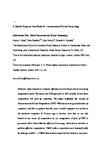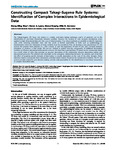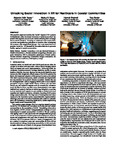A Hybrid Computer Case Study for Unconventional Virtual Computing

Date
2016-03-15Author
Subject
Metadata
Show full item recordAbstract
Improvements in computer efficiency are not always due to increasing computation speed. The mouse and GUI approach to OS’s actually slowed down computation, but sped up computing. This paper highlights the concept of Unconventional Virtual Computation (UVC). With the increasing virtualization of computers, and the recognition that this year’s virtual computers are as fast as the hardware computers of 10 years ago, it becomes clear that we are only limited in our modes of computation by our imagination. A form of UVC is presented called Pulsed Melodic Affective Processing, which utilizes melodies to perform affective computations. PMAP makes computation more human-friendly by making it audible – a PMAP data stream sounds like the emotion it represents. A hybrid computation system is presented combining UVC PMAP with a Photonic Quantum Computer, in which the PMAP musico-logic circuit keeps the QC in a state of entanglement.
Collections
Publisher
Journal
Volume
Issue
Pagination
Recommended, similar items
The following license files are associated with this item:
Related items
Showing items related by title, author, creator and subject.
-
Constructing Compact Takagi-Sugeno Rule Systems: Identification of Complex Interactions in Epidemiological Data
Zhou, Shang-Ming; Lyons, RA; Brophy, S; Gravenor, MB (Public Library of Science (PLoS)United States, 2012-12-14)The Takagi-Sugeno (TS) fuzzy rule system is a widely used data mining technique, and is of particular use in the identification of non-linear interactions between variables. However the number of rules increases dramatically ... -
Unlocking Social Innovation in XR for Healthcare in Coastal Communities
Veliz Reyes, Alejandro; Varga, M; Bradwell, Hannah; Baxter, R (IEEE, 2023-03-25)This position paper reconsiders the “social” aspect of XR systems for healthcare, often developed following a “problem-solution” approach that neglects sociocultural factors affecting their codesign and successful adoption. ... -
Towards Quantum Computing for Audio and Music Expression
Itaboraí, Paulo Vitor (University of Plymouth, 2023)This research delves into the initial approaches of the use of emerging Quantum Computing technologies in music practice, anchored on preliminary studies on Quantum Representation of Audio (QRA). The approach is ...




